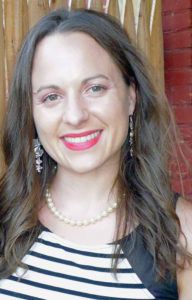My wife and I have a routine of reading together during the winter months. As we settled into our first winter in our new house in the small borough of Chambersburg, Pennsylvania, I read Eight Bullets: One Woman’s Story of Surviving Anti-Gay Violence by Claudia Brenner (with Hannah Ashley) aloud to my wife, a few pages at a time, for about a month. What the title of the book doesn’t say is that there’s an account of not surviving, too. Late at night, most of the time right before we fell asleep, we digested small sections of Brenner’s story of survival and the murder of her lover, Rebecca Wight. Brenner captures the horrific details of her May 13, 1988 camping trip with Wight, of how Stephen Roy Carr’s homophobia led him to shoot eight bullets at them. The first five bullets hit Brenner; the sixth and seventh killed Wight (one in her head and one in her back). The eighth bullet missed.
On the day of the hate crime in May of 1988, Brenner managed to walk miles out of the Michaux State Forest in Pennsylvania with shards of bullets in her mouth and throat, holes in her neck, face and arm, a cape of blood, and a flashlight. She stumbled onto Shippensburg Road and eventually hitchhiked to the Shippensburg police station. From the police station she was taken to Chambersburg hospital, about ten miles down the road, and then she was transported by helicopter to Hershey Medical Center. My wife and I live two blocks from the hospital where Brenner’s mangled body was lifted out by helicopter; this is where my wife and I read her story, under the covers, waiting for winter to get on its way. A few times a week we hear helicopters outside of our bedroom window as they come and go from the hospital—their rotary wings chop air and little waves of wind push against the trees in our backyard.
The sociopolitical climate where my wife and I live—in Red America—and the lack of rights we have as a lesbian couple in Central Pennsylvania hang over our heads. We knew what we were getting into when we moved here, that there was no ban on discrimination against us, and that there would be other challenges we’d face as a gay couple. We didn’t know that the murderer’s lawyer, Michael George, would run for a seat on the Supreme Court of PA in 2015 during the first year we’d vote in PA. George didn’t win. We didn’t know that we’d experience discrimination at one of the kennels where we’d board our dog, that getting an oil change or going out to eat came with potential threats (especially if we held hands), that we’d be treated as the lesser sex by our neighbors, and that many realtors would stop returning our phone calls. Or did we know all of this and it just didn’t happen until we got here?
We need to absorb Brenner’s story of survival and trauma. In a way, Eight Bullets is a reminder of how important it is for us to build a foundation in conservative Central Pennsylvania. Planting roots here and being out lesbians might help sanitize the anti-gay soil. The trail of Brenner’s story uncannily follows my wife and me through our newish weekend routine—we drive to a farm just outside of Gettysburg every Saturday to get locally grown produce, fresh eggs, and locally sourced cheese. This thirty-year-old anti-gay murder and trauma story also traces an emotional dotted line that we crossed when we moved onto PA soil at the end of July in 2014, just before the start of the fall semester at Shippensburg University. My teaching job at the university is wonderful, but moving to Pennsylvania from New York felt like a move to a foreign country; the culture shock still has tremors five years later. We both identify as New Yorkers at heart, and you can sure as hell tell that we are outsiders in these sleepy PA towns. Seventeen years ago, when we met at SUNY Binghamton, we spent a lot of time farther upstate in Ithaca, NY—Brenner’s home base.
Over the past five years we have lived in three small PA towns within about a forty mile radius. Little did we know about the Brenner and Wight story and that we had moved so close to the murder scene in the Michaux State Forest on the Appalachian Trail. During the first few years as Pennsylvania residents, we often walked adjacent trails with our dog. We pretty much continue to circle Brenner’s path of survival and the murder scene of Wight. Our house is eleven miles from Dead Woman’s Hollow Road—this is where Brenner and Wight parked their cars in 1988 before heading onto the Appalachian Trail.
With spring just around the corner, I am planning my first garden and will attempt to grow eight vegetables: queer lettuce, gay carrots, lesbian corn, lesbian tomatoes, lesbian potatoes, transgender kale, bisexual green beans, and lesbian brussel sprouts. I fear the dirt is tainted, that my first garden will wilt, but not because of horrific homophobia. There used to be a walnut tree not far from where I’ll plant my LGBTQ seeds. I recently learned about the toxic chemical that walnut trees produce called juglone. Although the walnut tree was cut down a few years ago, the soil might have remnants of the toxic walnut tree roots. There are some plants and veggies tolerant to walnut tree toxicity. I worry that tolerance is not enough for me to flourish here, or for the seeds to grow healthily. But, I will plant them just the same and hope that the vegetable roots don’t tangle with murder.

Nicole Santalucia is the author of Because I Did Not Die (Bordighera Press, 2015) and Spoiled Meat (Headmistress Press, 2018). She is a recipient of the Charlotte Mew Chapbook Prize and the Edna St. Vincent Millay Poetry Prize. Her non-fiction and poetry have appeared in publications such as The Cincinnati Review, TINGE, Zócalo Public Square, The Seventh Wave, Bayou Magazine, Gertrude, Flyway: Journal of Writing & Environment, The Boiler Journal as well as numerous other journals. Santalucia teaches at Shippensburg University in Pennsylvania and has taught poetry workshops in the Cumberland County Prison, Shippensburg Public Library, Boys & Girls Club, and nursing homes.


Comments are closed.